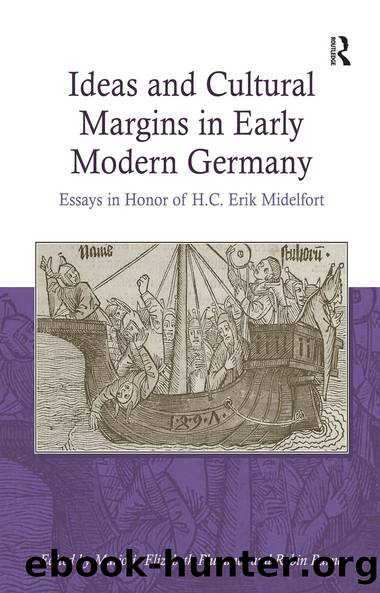Ideas and Cultural Margins in Early Modern Germany by Marjorie Elizabeth Plummer

Author:Marjorie Elizabeth Plummer [Plummer, Marjorie Elizabeth]
Language: eng
Format: epub
ISBN: 9780754665687
Barnesnoble:
Publisher: Taylor & Francis
Published: 2009-06-23T00:00:00+00:00
Chapter 11
Alexander Seitz and the Medical Calling: Physic, Faith, and Reform
Robin B. Barnes
Not so very long ago, historians of medicine and Reformation scholars hardly took notice of one another. In recent years that situation has begun to change, and it is now possible to assert straightforwardly that âthe Reformation, urban culture, and medicine were intertwined in ⦠crucial ways.â1 Yet the questions currently being posed have to do almost exclusively with the Reformationâs influence on medical thought and practice, as if the connections all worked in one direction. This essay seeks to uncover some different dimensions of the relationship by exploring ways in which the development and popularization of certain medical ideas, practices, and institutions during the decades before 1520 helped prepare the ground for a major reform movement in the German and Swiss towns. My focus is on the world of urban physicians and surgeons. Both their theoretical orientation and their professional goals, I argue, led these medical thinkers and practitioners to cultivate new lay attitudes about health, healing, and the common good; thus they helped to shape what Bernd Moeller once called âthe unique mentality of the German townspeople before the Reformation.â2 By the same token, we have reason to think that town physicians were especially predisposed to become early supporters of a movement that looked to cure the ills of Christendom.
For a central point of reference we can look to a physician whose surviving works span the years before and during the early Reformation, and who illustrates some of the values and concerns common among urban medical professionals during these decades. Originally from Marbach in Württemberg, Alexander Seitz (c. 1470-c. 1545) studied in Tubingen and Rome before taking his medical degree, probably at Padua sometime after 1500. After several years pursuing a successful practice in his home town he was forced to flee the duchy, having supported the âPoor Conradâ uprising against Duke Ulrich. Much of his life thereafter was unsettled. He practiced successfully but briefly at Baden, then spent at least two years (1519-21) as an officially appointed city physician at Munich. Here he would undo his welcome by sharply attacking the local custom of phlebotomizing pregnant women. What ultimately drove him out of Munich and Bavaria, though, were his strong evangelical leanings. His early attraction to the reform took him to Strasbourg and Zurich before landing him at Basel. Here as well he practiced medicine, though probably not as a municipal physician [Stadtarzt]. Again he became involved in controversies, the details of which remain obscure. by the early 1530s he was married, but we have scant evidence about his personal relationships. He seems to have spent his last years practicing at Landau.3
However we might weigh his evident contentiousness and unruly political involvements, seitz was certainly a learned and dedicated professional therapist who became a fervent adherent of the reform movement. Although he did apparently grow disillusioned with the mounting sectarian strife among Protestants, he remained an admirer of Luther, whom he regarded as the prime restorer of the gospel.
Download
This site does not store any files on its server. We only index and link to content provided by other sites. Please contact the content providers to delete copyright contents if any and email us, we'll remove relevant links or contents immediately.
| Africa | Americas |
| Arctic & Antarctica | Asia |
| Australia & Oceania | Europe |
| Middle East | Russia |
| United States | World |
| Ancient Civilizations | Military |
| Historical Study & Educational Resources |
Machine Learning at Scale with H2O by Gregory Keys | David Whiting(4292)
Never by Ken Follett(3937)
Fairy Tale by Stephen King(3370)
Oathbringer (The Stormlight Archive, Book 3) by Brandon Sanderson(3156)
The Man Who Died Twice by Richard Osman(3072)
Will by Will Smith(2908)
Rationality by Steven Pinker(2352)
Can't Hurt Me: Master Your Mind and Defy the Odds - Clean Edition by David Goggins(2323)
The Dark Hours by Michael Connelly(2300)
Friends, Lovers, and the Big Terrible Thing by Matthew Perry(2219)
The Dawn of Everything: A New History of Humanity by David Graeber & David Wengrow(2197)
Principles for Dealing With the Changing World Order: Why Nations Succeed and Fail by Ray Dalio(2039)
A Short History of War by Jeremy Black(1842)
HBR's 10 Must Reads 2022 by Harvard Business Review(1839)
Go Tell the Bees That I Am Gone by Diana Gabaldon(1754)
A Game of Thrones (The Illustrated Edition) by George R. R. Martin(1722)
Kingdom of Ash by Maas Sarah J(1668)
515945210 by Unknown(1660)
443319537 by Unknown(1545)
